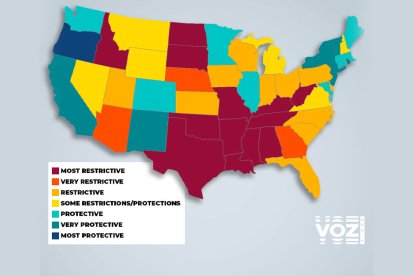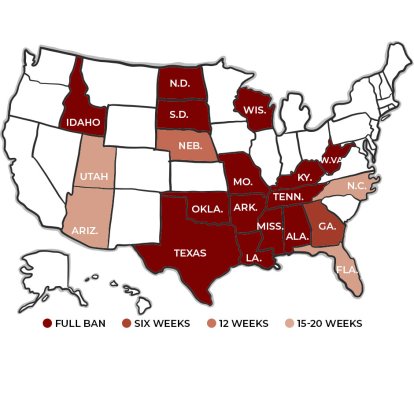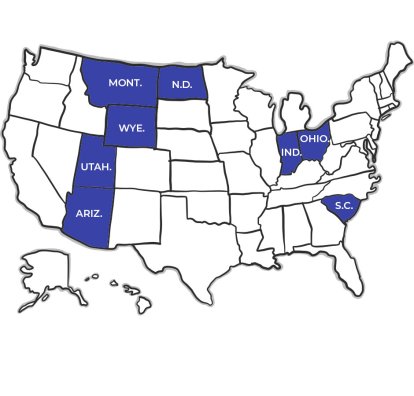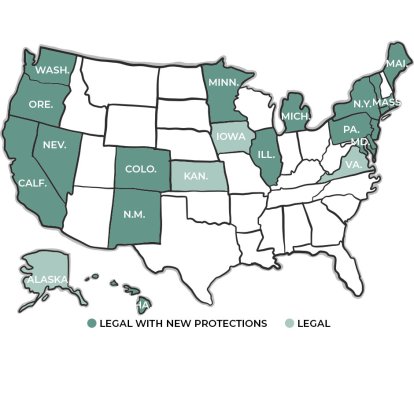One year after Dobbs vs Jackson: Political and judicial war over abortion escalates
Following the Supreme Court's ruling, the states have been engaged in a spiral of laws appealed to the courts in one direction or the other.

(Christian Camacho / Voz Media)
One year after the landmark Supreme Court ruling which determined that abortion is not a constitutional right, the country is experiencing political and judicial warfare over the attempts by the states to legislate to prohibit or shield access to abortion, depending on the governor's political party. At this time, laws have ranged from the total ban in states such as Alabama or Texas, passing through the so called "heartbeat laws" (it is illegal from the sixth week of gestation) to more typical laws that allow it "until fetal viability" (22-26 weeks), to the most radical one, in Oregon. In many cases, the courts will have the final say.

band-ing
Total prohibition
As many as 14 states currently prohibit abortions at any time during pregnancy. They are Alabama, Arkansas, Arkansas, Idaho, Kentucky, Louisiana, Mississippi, Missouri, North Dakota, South Dakota, Oklahoma, Tennessee, Texas, West Virginia and Wisconsin. Some of these states allow abortion in the case of rape or incest, and others have explicitly included in their state constitutions that abortion is not a right.
In this regard, North Dakota (only up to the sixth week), West Virginia and Wisconsin allow abortion in any of these circumstances. In Mississippi, it is only allowed in the case of rape. In Wisconsin, the rule even predates the Supreme Court ruling, although since 2022 the governor and attorney general filed legal action to change the legislation.
Louisiana, Alabama, Tennessee and West Virginia added that abortion is not a right in their constitutions. In Kentucky, citizens decided by referendum not to include this clause in the state constitution. In addition, in Idaho, the state Supreme Court ruled that there is no constitutional right to abortion.
Indiana passed a law banning abortion almost completely, which was blocked by two courts and is now in the hands of the state Supreme Court. Wyoming also has the rule that would almost completely restrict abortions in the court system. This state was also the first to approve a bill banning the abortion pill, which was also appealed. In Arizona, a judge lifted a block on an 1864 law banning all abortions, while the legislature passed a rule establishing the 15-week limit. The more restrictive law is again under appeal.

ban-bloked
Heartbeat laws
The prohibition of abortion after the sixth week of gestation, when the fetal heartbeat becomes perceptible, is in force only in Georgia at this time. Other states, such as Florida, South Carolina and Ohio have approved it, but these laws have been appealed to the courts and await a ruling. Even in Georgia, the rule had to be reinstated by the state Supreme Court after being declared unconstitutional by a lower court.
Limited to weeks or until fetal viability
This margin includes both Republican and Democratic states. Generally, conservatives opt for stricter margins, while those governed by Democrats tend to tend towards 22-26 weeks, at which time it is considered that the fetus would be viable outside the womb.

lega-ing
The most restrictive within this group is Nebraska, which sets the 12th week of gestation as the deadline for terminating a pregnancy. Governor Jim Pillen tried to push through a rule that would reduce the deadline to six weeks but was unsuccessful. North Carolina will have the same deadline as of July 1 (20 weeks currently), when the rule approved by lawmakers takes effect. As a curiosity, Governor Roy Cooper vetoed the rule, but the General Assembly overrode the veto. These states are followed by Florida, which currently has a 15-week limit, although as noted above, the court must rule on the proposed reduction to six weeks.
Utah also has a special situation. Abortion is legal up to 18 weeks, although judges must decide on a law passed that bans abortion clinics from 2024.
The majority of states opt for a solution between the 22nd week (Iowa and Kansas, with Indiana, Ohio, and South Carolina pending in the courts), the 24th (New Hampshire, Massachusetts, Nevada and Pennsylvania) or until fetal viability (Montana, Wyoming, both with laws to reduce the term in court, Virginia, California, Connecticut, Delaware, Hawaii, Illinois, Maine, Maryland, Michigan, Minnesota, New York, Rhode Island and Washington).
No gestational limit
Six states allow abortion without gestational limit. These are Vermont, New Mexico, New Jersey, Colorado, Alaska and Oregon, as well as Washington, D.C. Within this group there are major differences. Alaska, for example, allows only physicians to perform the procedure, while Oregon has the most permissive abortion laws in the country. California and Vermont have included abortion rights in their constitutions.
Abortion pill
The Supreme Court ruling also brought to court the use of mifepristone, one of the two chemical abortion pills and the most widely used in the country. In April, Amarillo, Texas, District Judge Matthew Kacsmaryk suspended FDA approval of the drug, although the decision was quickly appealed by the Biden administration and is now in the hands of the Supreme Court, which, for the time being, allows it to continue to be marketed.
RECOMMENDATION





















